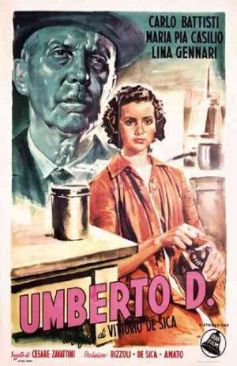Umberto D
By Chris Middlehurst
Published on September 4, 2016

I remember Umberto’s cry “Flike!” as well as Billy Kaspar’s call for Kes or little Joey’s agonised plea for “Shaaaane” to “come baaaaaaaaaaaaaaack!” as perhaps the saddest, most desperate moments in cinema.
All three, from radically different films, are cries from the souls of three lonely, disenfranchised characters. Only one of those cries is ever answered. Flike does return. It is a moment that on paper could come across as mawkish and shamelessly sentimental, but that in the skilled hands of director Vittorio de Sica, in a film released in 1952 at the height of post-war economic hardship Italy, becomes a rare moment on film in which sudden joy is followed by grim resignation and solemn concern for the near future of the characters.
De Sica is very good at creating a sense of dread by the time his projects fade to black: his other, more well-known film The Bicycle Thieves ends on a similarly bleak note as the protagonists dissolve into the faceless crowd, even more destitute and shunned by society than they were during the opening credits.
Umberto D. tells the story of an elderly man who is evicted from his rented apartment, left to die on the streets and unable to care any more for his only friend, Flike. Did I mention, by the way, that Flike was a dog? Well, he is. But there are times when de Sica focuses on the animal’s movements so intensely that we can be forgiven for finding human qualities in Flike that are not to be found in any of the other human characters in the film.
Unlike Lassie, Mr Pickles or Tim Allen, Flike is neither house-trained nor a dashing, four-legged hairy hero privy to table manners and saving the day for middle-class Americans: he is fiercely intelligent, feisty and intolerant of being patronised by those who dare to persecute his owner. So intolerant in fact that he even runs away from him at one point in the film’s most desperate hour, where Umberto must face the indignation that countless others like himself have to face when begging for food. This moment is as angry and powerful as anything I have seen on film from Ken Loach or other social realist filmmakers, serving as a reminder to us all of the cruelty that man inflicts upon man. I do not know if “Flike” was directed by de Sica or a dog trainer, but whoever it was creates a four-legged character for the movies that has far more complexity and humour than any human “character” in the last decade of cinema.
Whilst Umberto has a few human friends, such as the kindly maid who pities him, the film’s final moments demonstrate that he has been abandoned by all but Flike, and his skip in the park with Flike rising on his hind legs in a parody of the human walk evoke anger and disgust that Umberto has been forced into such hardship and despair by his fellow man.
Umberto D is an angry, compassionate and indignant film. The governing elite are not seen, but the effects of their actions are all too apparent in de Sica’s depiction of Rome. In today’s climate of economic despair and ever-rising social inequality, the themes he raises in his films seem more relevant than ever.
Revisiting Umberto D. acts as a reminder to us that no matter how many work helmets some career politicians may don for a day, they will never attain anything near the humanity that “Flike” does in the final moments of Umberto D.
The Author

Chris Middlehurst is The New Jurist film review editor. Chris graduated from Leeds University with a BA in English Literature, where he served as President of the LUU Film Making Society and also took elective modules in Chinese, Italian and World Cinema. He currently lives in Leeds and volunteers regulary at the wonderful Hyde Park Picture House, where he urges film lovers to visit if they get the chance!
Article picture: Wikipedia.


